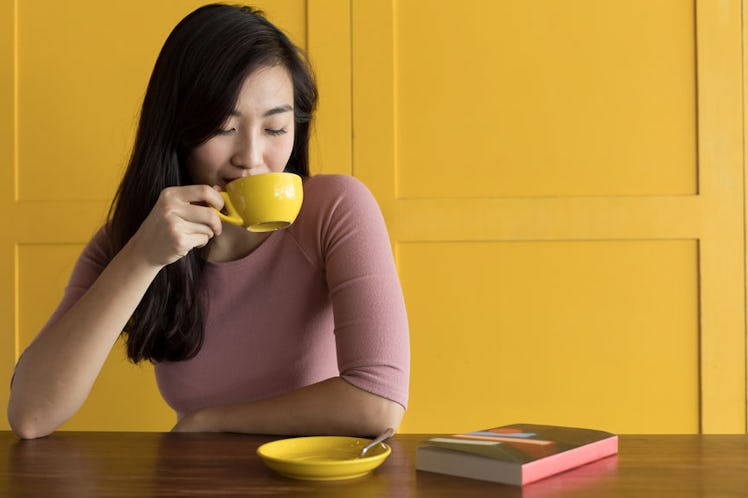
This Is Why You're Obsessed With Coffee, But Can't Stand Tea, According To Science
The question of whether you like coffee or tea is one of those debates that's a lot like weighing The Beatles versus The Rolling Stones, or pancakes versus waffles: The choice reveals a lot about your personality, at least IMO. Personally? I'm a coffee gal, through and through. And while you might imagine that your preference for one of these morning beverages or the other simply has to do with habit, the reason why you like coffee and not tea is so, so much deeper than that, according to the results of a new study.
You might not think that your unique genetic makeup has anything to do with what you like to sip on in the morning, but according to The Conversation, new research from the University of Queensland in Australia suggests that certain genes can influence how bitter flavors taste to your tongue, and can thus be responsible for your beverage habits.
As per The Conversation, the study, which has been published in the scientific journal Scientific Reports, found that something called your "bitter taste receptor genes" may be responsible for your body's "perception of caffeine" — aka how much you love it or hate it, and where you prefer to get the buzz from. Study co-author Daniel Liang-Dar Hwang wrote in The Conversation that past research from his team has already shown that inherited genes do, indeed, play a role in how your body responds to coffee versus tea, but the researchers wanted to dive even deeper into the topic to see if the genes that are responsible for bitter tastes and caffeine perception also influence how much, and which of these two drinks, you like to sip on more.
According to The Conversation, the study looked at the coffee- and tea-drinking habits of 400,000 people in the UK between the ages of 37 and 73, along with data on the sample group's genetic makeup. Long story short, the researchers compared the participants' drink preferences with their genetics, and they found that those who carry that specific bitter taste receptor gene I mentioned earlier — which can basically "perceive" caffeine more intensely, or at least in a more positive, favorable way — are much more likely to drink lots and lots of coffee.
In fact, Hwang wrote in The Conversation, his team found that for each "extra copy" of that bitter taste receptor gene, it seemed to make the individual 20 percent more likely to be a coffee drinker. The researchers called these people "super-tasters" of caffeine, and they found that these individuals also happen to drink less tea. I definitely have that gene, BTW.
As for the participants who reported drinking tea more than coffee, well, they were simply found to have genes that are more likely to taste different types of bitterness. And in general, the researchers found, tea drinkers are essentially more sensitive to bitter tastes. In other words, even when they want or need a caffeine boost, their preference is usually for something that's a little less intense on the taste buds.
But listen, Hwang wrote in The Conversation that your genes aren't necessarily the end-all-be-all deciding factor in what you like to drink. As you've probably noticed in your own experiences, your tastes for different drinks and foods can easily change over time for a number of reasons. Plus, there are benefits to both coffee and tea, so it's not as if one is "better" for you than the other. While coffee sometimes gets a bad rap, Harvard Health points out that the bev has been linked to lower risks of heart disease, Parkinson's disease, and even some forms of cancer.
As for the health benefits of tea, well, the list goes on, and it depends on what type you like best. But first and foremost, tea is a great source of antioxidants, according to research published in The Journal of Nutrition, and much like coffee, the warm bev has also been linked to improved heart health.
BRB, I'm suddenly craving caffeine so badly.